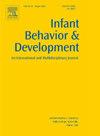The impact of remembered emotion socialization on maternal sensitivity to distress via beliefs about crying
IF 1.9
3区 心理学
Q3 PSYCHOLOGY, DEVELOPMENTAL
引用次数: 0
Abstract
The manner in which adults were parented in their own childhood is a known predictor of the manner in which they parent their own children. One potential mechanism explaining this intergenerational transmission of behavior is parental beliefs. This longitudinal study examined the association between mothers’ remembered emotion socialization, specifically their perceptions of how their own mothers responded to their childhood distress, and their sensitivity to their own infants’ distress at both 6 and 14 months and possible indirect effects via mothers’ beliefs about crying. Participants were 259 primiparous mothers (128 European American, 131 African American). The path analysis indicated that mothers who recalled their own mothers responding to their childhood distress in a non-supportive manner had more mother-oriented beliefs (i.e., crying is a nuisance to be suppressed for the comfort of the mother and others) which predicted lower maternal sensitivity to their children’s distress at 6 months and 14 months. Although there was a positive association between supportive emotion socialization and infant-oriented crying beliefs (i.e., crying as a meaningful signal that warrants a response) and a marginal but non-significant positive association between infant-oriented crying beliefs and maternal sensitivity to distress at 6 months, the indirect pathway was not statistically significant. Thus, identifying mothers who experienced non-supportive emotion socialization in childhood and providing preventative interventions to reduce their mother-oriented cry beliefs may promote more adaptive parenting in infancy.
记忆情绪社会化通过哭泣信念对母亲痛苦敏感性的影响
成年人在自己的童年时期被父母养育的方式是一个已知的预测因素,可以预测他们养育自己孩子的方式。解释这种代际行为传递的一个潜在机制是父母的信念。这项纵向研究考察了母亲记忆中的情感社会化(特别是她们对自己母亲如何应对童年痛苦的看法)与她们对自己6个月和14个月大的婴儿痛苦的敏感性之间的联系,以及母亲对哭泣的信念可能产生的间接影响。参与者是259位初产母亲(128位欧洲裔美国人,131位非洲裔美国人)。通径分析表明,回忆起自己的母亲以非支持的方式回应童年痛苦的母亲有更多的母亲导向信念(即,哭泣是为了母亲和他人的安慰而被压抑的一种讨厌的东西),这预示着母亲对孩子6个月和14个月的痛苦的敏感性较低。虽然支持情绪社会化与婴儿导向型哭闹信念(即哭闹是一种需要做出回应的有意义的信号)之间存在正相关,而婴儿导向型哭闹信念与母亲6个月时的痛苦敏感性之间存在微弱但不显著的正相关,但间接途径没有统计学意义。因此,识别在儿童时期经历过非支持性情绪社会化的母亲,并提供预防性干预措施来减少她们的母亲导向型哭泣信念,可能会促进婴儿时期更具适应性的养育方式。
本文章由计算机程序翻译,如有差异,请以英文原文为准。
求助全文
约1分钟内获得全文
求助全文
来源期刊

Infant Behavior & Development
PSYCHOLOGY, DEVELOPMENTAL-
CiteScore
4.10
自引率
4.80%
发文量
94
期刊介绍:
Infant Behavior & Development publishes empirical (fundamental and clinical), theoretical, methodological and review papers. Brief reports dealing with behavioral development during infancy (up to 3 years) will also be considered. Papers of an inter- and multidisciplinary nature, for example neuroscience, non-linear dynamics and modelling approaches, are particularly encouraged. Areas covered by the journal include cognitive development, emotional development, perception, perception-action coupling, motor development and socialisation.
 求助内容:
求助内容: 应助结果提醒方式:
应助结果提醒方式:


